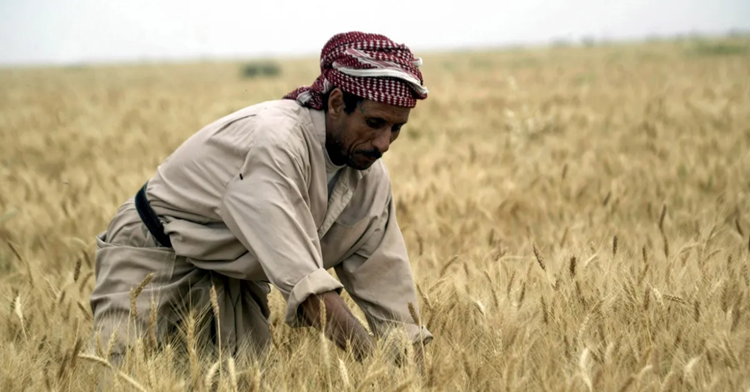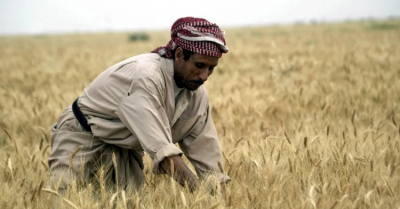Ameen Salah has been used to planting wheat near the banks of the Euphrates River in Iraq, but ongoing drought has pushed him to cultivate unexpected lands deep in the harsh Najaf desert. He stated that his land, irrigated by sprinklers connected to wells drilled over 100 meters underground, now produces double the yield compared to when he relied on old methods that flooded fields with river water. Salah, walking through his field, said, "This year is the golden year, or the golden season due to the high level of production thanks to the weather and rainfall." He pointed out the benefits, which include spending less money and consuming less water, as well as harvesting a larger and better quality yield.
The Iraqi government claims that this officially supported shift has allowed the country to double the areas cultivated with wheat this year to about 2.1 million acres (850,000 hectares) compared to around 400,000 hectares last year. Ministry of Agriculture spokesperson Mohammed Al-Khazaei stated that this led to a harvest of approximately four million tons of wheat, the largest in years, covering about 80% of the needs of a country with a population of 43 million people who consume bread at nearly every meal.
The shift in methods is driven by necessity, as Iraq’s two main rivers, which have nurtured civilization for thousands of years, have lost more than half of their water due to declining rainfall and excessive dam usage. Drilling for water in the desert can provide immediate relief in a country the United Nations says is among the five most vulnerable to climate change globally, where climate-induced migration has already begun.
However, agricultural experts and environmental specialists warn that the intensive use of well water could lead to the depletion of aquifers in the desert. Kareem Bilal, an agricultural engineer and former director of the Agriculture Department in Najaf, noted that Iraq has over 110,000 wells, but only a small fraction, about 10,000, are equipped with modern systems that prevent water waste. Hadi Fattahallah, director of public policy at a development consultancy researching agriculture in Iraq, stated that resorting to desert wells indicates a dire situation. He said, "Aquifers that gather water for thousands of years will disappear within a few years if used this way." Fattahallah believes Iraq should focus on modernizing and developing agriculture and engage in water diplomacy with its neighbors to increase river flow and revitalize agricultural areas that have not yet recovered from the consequences of war.
Large institutions have adopted methods to shift to desert wells. The authority overseeing the shrine of Imam Hussein (Al-Ataba Al-Husseiniya) is now cultivating 400 hectares of wheat in the desert, 55 kilometers from the shrine, up from just 100 hectares in 2019. A large portion of the grains enters one of the largest food programs managed by a government in the world, which provides monthly rations for most families. However, the program has faced pressures that the government seeks to avoid, including the failure of the harvest seasons in 2021 and 2022 due to drought and rising food prices stemming from the Russian invasion of Ukraine. Fattahallah remarked, "The government is trying to alleviate a lot of pain, but this is not adapting to climate change; it is a form of sedation."




